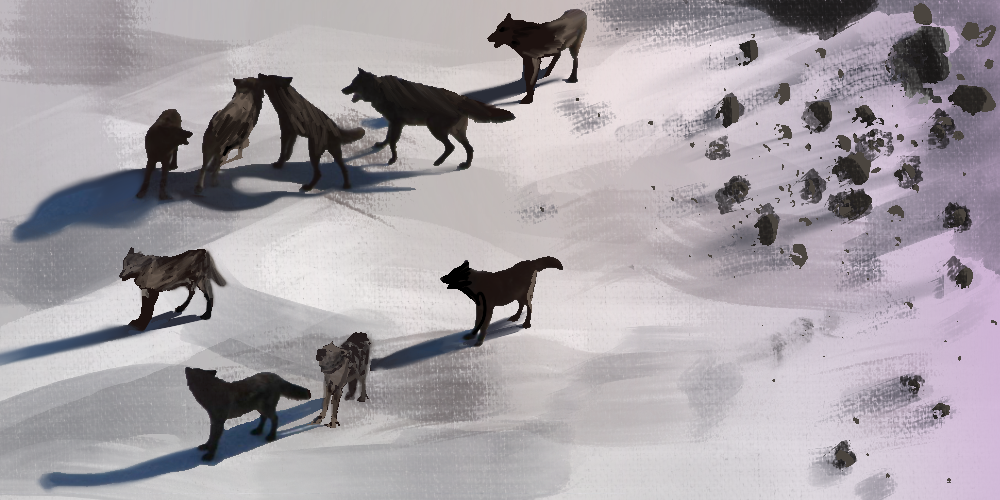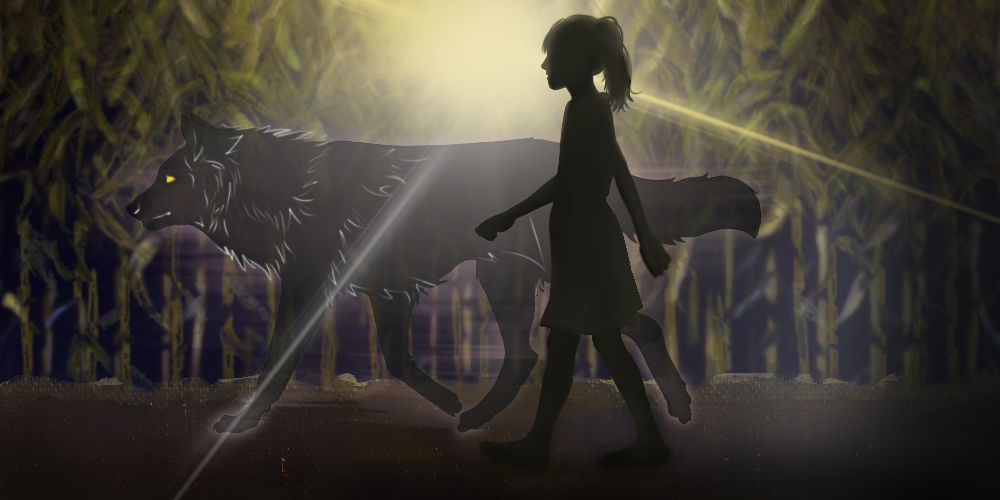Almost three decades ago at Yellowstone National Park, 14 wolves were re-released into the wild. They charged ferociously into the landscape, lunging at elk, deer, and bison. They howled for each other, their sheer volume breaking miles of forest and land. Elk darted fearfully far from the woodlands in search of shelter from their returned predators, but they brought ripples — these wolves — beyond fear and frenzy. Their presence, in turn, meant the peaceful sprouting of willow, aspen, and cottonwood trees; uninterrupted by hungry elk. Then the growing restfulness of turbulent rivers that sighed with relief at their newly stable banks, rich with forest. Many pleasant surprises followed; a thriving abundance of birds, rabbits, mice, beavers, and several other species. The Yellowstone wolves brought chaos, anomaly, and disruption. But above all else, they restored. They gave the land its life back.
Once, there was a wolf that gave me mine. We’d lie together amidst the dull gold of a cornfield that united our worlds — my end sketched into a neighborhood with a park and an array of houses; hers growing wildly into a dark, endless forest. Calmly, she leaned against the buttery grass, while I rested my head against her fur, breathing in the land we shared. It was often enough to lie like this and watch the sky curl into wisps above us; clouds drifting gently past with no fixed form.
Sometimes, she would ask questions in a voice that held the age and wisdom of large pine trees. “How have you been?” My words blurted themselves out as if a tight lid had been wrenched off them. Planets made from playdough, stories written in crayon, strange boys that ate bits of paper, songs I loved that a teacher I hated played on the classroom speakers. She listened with unwavering patience. On longer walks towards the houses, she would probe further, gently: “Are you alright?” And when my body inevitably shrunk into itself — arms withering, knees folding, head bowing — she held its weight while she spoke: “You are loved.“
•
For most of my life, I have lived with both an incessant need for love and a visceral, stomach-churning discomfort in recognizing that need. Or for that matter, recognizing that I had any needs at all — love, attention, acknowledgment, or otherwise — triggered all sorts of shaking, sweating, and mind-racing. The need for love is, of course, entirely human. But what is one to do when their self-conception is already subhuman, when expressing needs means taking up space — already too much of it? Space, for people like me, had to be earned, so I spent much of my time performing strenuous emotional gymnastics to squeeze into any readymade molds. The always-responsible student, the always-available girlfriend, the always-useful friend. As a child, I was still fetching legos and colored pencils for the other kids, letting stories spill from their tiny mouths while I nodded along, sinking into the background of my own life. A side character in every moment, except those spent with a wolf in a parallel world.
“How vastly different the real wolves seem from mine,” I think to myself now, throat running dry at the thought of my childhood imagination drifting from me. I am terribly afraid of losing the wolf; my only solace amidst always trying to prove I am worthy of love, and yet never quite getting there. The molds are constricting and I can no longer force myself into them. I try to rekindle the wolf, thinking of all the ways we have imagined wolves that I can remember. The vicious grandmother-eating beast in “Little Red Riding Hood,” the unflinchingly loyal dire wolves of the Stark family in Game of Thrones, and the domineering yet nurturing wolf goddess Moro in Princess Mononoke. Whether glorified, demonized, or accepted, there is a wildness I see in all these wolves. In every single one but mine.
•
Wildness is something I learned to appreciate recently from Charlotte McConaghy’s Once There Were Wolves, which imagines a revivalist project similar to Yellowstone’s, set in the Scottish highlands. I took my time with that novel, absorbing its last few pages in the backseat of an empty classroom. Then something overcame me. Tears that rolled down my cheeks fell with an unusual density. Something inside me began to quake, while the rest of me, for once, remained perfectly still. I thought deeply about the characters, all of whom shook my perceptions of what it means to be human. I thought of the wolves, and of everything they had to endure. How they howled for their loved and lost. How they tore savagely through wind, rain, and life for themselves, and for each other. How they kept entirely separate from human beings, until one brief, surreal moment when they did not. I think now of the way Inti, a beautifully vulnerable protagonist, spent years in the wild learning their ways, and I feel a vigorous inclination to run straight into the forest I remember . . . along with a crushing realization that I had never actually ventured past the cornfield. I had never known her world.
Writing is always an attempt of some kind. A constant reaching toward something or someone in the hope of an embrace. With these words, at the brink of a cornfield on a single remaining patch of golden grass, I am reaching. I want to relearn her. But this time, in the wild.
•
The cornfield and forest I found her in actually do exist in Bahrain, where I grew up. I made a habit of watching them regularly, legs dangling against the wall that separated them from the park in my neighborhood. For hours I would gaze, but never jump — until one day I did, eyes closed in my mother’s bedroom after everyone had fallen asleep. My memory plays with me but I remember a bubbling frustration trapped in my veins that day. A faint scene returns with the feeling.
I had been running towards the same wall earlier that night, twirling and skipping along the way. No one was awake, and the world was finally mine. There was a Coldplay song I saved for these visits to the wall, In My Place. With all my twelve-year-old might, I leaped between benches, and raced from lamppost to lamppost, my arms swinging wildly by my sides. The lyrics I usually mouthed along to now escaped me loud and free, music slicing echoes into the crisp, quiet air around.
I was too engrossed in music and movement to notice the footsteps. It was my father’s screams that jerked me out of my trance. DON’T MOVE, he bellowed, and I froze. You must be up to something, he spat, and I sank. We’re leaving, he demanded, and I obeyed, dragging my feet behind me.
Later that night, in a different universe, I came back.

Weeds blew softly in the wind, tickling my arms as I landed. She came later, quiet and stealthy as a predator with her steps. I remember reading about how wolves often walk in the tracks of their prey, careful not to leave a trace before they pounce. There was an uncertainty to her calmness. Something more than stillness and constancy.
When she appeared, she stood before me determinedly, her chest jutting in shades of gray and ivory. “Shall we?” she paused, I nodded, and so began our several walks together. The details are hazier now, within layers of memory and imagination, but I remember that there were reasons why no one else approached us on our walks in the neighborhood. Not the boy who had the guts to push me into the deep end of the pool. Not the girl who made fun of my buck teeth and awkward features every single day. None of the children who taunted me, who made inside jokes of my name and my skin. They darted away, often terrorized if they found themselves even within ten feet of us. Some people — one of my teachers, a creepy old man on a bike, and even my father — were nowhere to be found. She would speak to me calmly, my wolf. But her eyes glinted a dangerous, beastly yellow.
I remember vividly the texture of her fur — a marriage of coarse and smooth. She was a gray wolf — one of the rarer of the species — and she carried this knowledge with her. I think of the single time I heard her howl deep in the forest before she came to me. How, for that one long moment, she cried piercingly into the night, announcing a loss only she bore and alerting the wildlife around her. Perhaps I have been treading too carefully around people, clamping a hand over my mouth to stop my feelings from spilling. It has become tiringly difficult to breathe.
•
Wolves are a compelling paradox. They are two opposing things at once, always. Independent and still interdependent. Calm and still unpredictable. Fierce and still staggeringly vulnerable. They are comfortable with their chaos, but I am still grappling with mine. I feel a jarring twitch in my neck as I type this with quivering hands, knowing there are secrets that slip through my fingers. I write anyway, to learn the ways of wildness as a mechanism for healing. But the wolves are not wild alone.
•
A few hours ago, amidst an arduous battle with myself in writing this essay, my phone lit up with a single unprompted text from a friend: “I love you so much it’s insane.” I read it now over and over on my phone, between writing, until the metal dissolves and I can feel her smooth-rough fur surfacing. I glance at the wolf magnet, tucked into the bottom right corner of my mirror, and her warmth emanates in the hands of the friend who brought and placed it there. “Tell me about the wolf,” she says, and then listens, deeply. Again, her scent wafts into various memories with my partner, where it takes only a silent lump in my throat for him to pause and pull me into an embrace, “You can cry, it’s okay,” and I break, howling. It is wild, in the fullest sense of the word, to be shown the love you need without asking for it. To be thinking in circles of your presence in the world, anxiously avoiding the line of “too much,” and then to be taken on a vast, chaotic tangent that soars through all kinds of your “too-much-ness,” still preserving love. I am beyond grateful to have found my people.
Perhaps we will never be like wolves. But there remains a crucial rewilding we must practice. From staying with chaos and uncertainty to finding love, and letting it swell on our skin, and in our throats, stomachs, and bones. From running, pouncing, screaming, and howling with no remorse to finding our pack and keeping warm together. Because at the end of the day when we are done fighting, there are backs we must lie against, life upon life upon life, to gain strength for tomorrow.•




